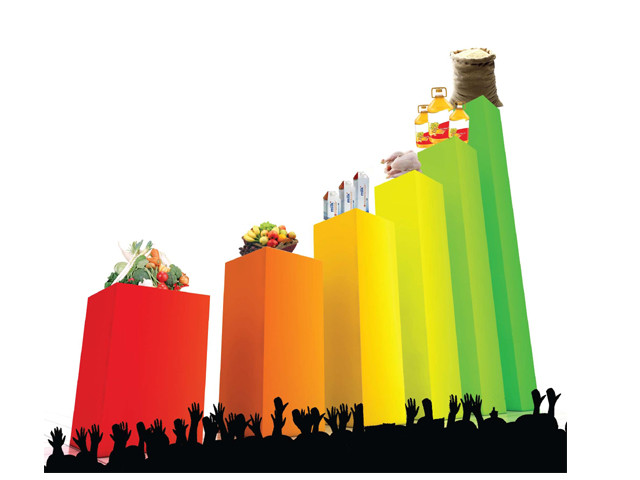Up, up and away
Perishable food costs rise by 53.9% in a single year.

The consumer prices index (CPI), an indicator to measure inflation in retail markets, revealed that the rise was primarily due to the escalating prices of food and fuel. All ten groups in the CPI witnessed inflation over the past one year, seven of them in double digits.
The highest increase is in the price of perishable food items – an astounding 53.9 per cent, a case of rapid or hyperinflation. Fifty per cent or higher inflation is defined as hyperinflation, a condition that makes money useless and greatly disrupts economic activity. Overall, the prices in the food and beverages group, which counts for 40.4 per cent of the commodities basket, increased by 21.24 per cent between in September 2010 compared to the same month in 2009.
“Given the alarming increase in food prices by 53.9 per cent, the food ministry’s proposal, pushed by the landlords, to increase wheat support price by another Rs50 per 40 kilogrammes (kg) is like murdering the poor,” said Dr Ashfaque Hasan Khan, dean of the National University of Science and Technology’s business school. The government is contemplating an increase in the wheat prices to Rs1,000 per 40kg.
With 15.71 per cent inflation, the real interest rate (minus inflation) has become negative by 2.21 per cent, which is considered detrimental to investment. According to Pakistan’s understanding with the International Monetary Fund, the real interest rate should remain positive. Experts fear that the State Bank of Pakistan may further push up the interest rate despite the fact that inflation is caused by the breakup of food supply chain.
“Since core inflation (non-food, non-energy) is less than 10 per cent there is no justification for further increasing the interest rate,” said Dr Hasan. The central bank has recently increased the key interest rate, (at which the SBP lends to commercial banks,) to 13.5 per cent. Experts feel that at a time when Pakistan desperately needs growth in the wake of the flood, any move to further increase the rate may adversely affect private sector credit.
The September inflation numbers do not surprise the finance ministry. “[The inflation is the result of the] triple affect of Ramadan, Eidul Fitr and floods and what the IMF and the government were expecting,” said a ministry official. He said the inflation would start declining from this month and the expectations are that it would come down to 13.5 per cent in October.
Between August and September though, inflation was 2.65 per cent, breaking the 26-month-old record of July 2008. According to an economist on the State Bank’s Monetary Policy Committee, it is an extremely high figure and says it indicates inflationary pressure. He does not rule out the possibility of further increase in the interest rate.
Between August and September 2010, the price of onions increased by 87 per cent, tomatoes by 24.9 per cent, chicken by 17.8 per cent, sugar by 11.7 per cent, wheat flour by 10 per cent and pulses by 11.3 per cent.
Average inflation during the first quarter (July-September) remained at 13.8 per cent, 0.3 per cent more than the revised annual government projection of 13.5 per cent. While announcing the federal budget the government projected inflation at 9.5 per cent. The finance ministry official said that the revised projection of 13.5 per cent does not take into account the effect of possible increase in power tariffs.
A breakup of the CPI basket shows that apparel, textile and footwear group prices increased 10.2 per cent in September 2010 compared to the same month in 2009. House rent increased by 7.6 per cent, fuel and lighting by 20.8 per cent, transport and communication by 15.6 per cent, recreation and entertainment by 14.4 per cent and medicare by 12.5 per cent.
Published in The Express Tribune, October 12th, 2010.



















COMMENTS
Comments are moderated and generally will be posted if they are on-topic and not abusive.
For more information, please see our Comments FAQ